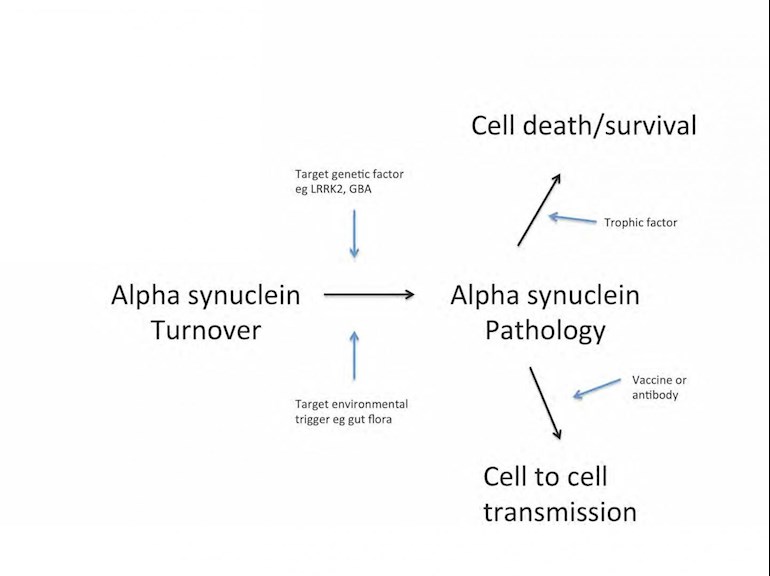🔼 Hint: The ever elusive "Holy Grail" lies among these little blue arrows 🔼
"We believe we can be optimistic that the next 20 years will see major breakthroughs towards the discovery of therapies that may slow, stop, or reverse PD." It's hard to be overly optimistic after 2 centuries without a solution, but here's a summary of the 'main contenders' for PD breakthroughs for the next 2 decades:
"New therapeutic targets following the discovery of genetic risk factors, such as autosomal dominant mutations in the LRRK2 gene; and the enzyme glucocerebrosidase (GCase), which is reduced in patients with mutations in the GBA gene - including treatment with Ambroxol, a drug already licensed for lung surfactant deficiency.
"Targeting "non-motor" features of PD such as cognitive, speech, gait, and balance difficulties and autonomic failure, which may precede the onset of motor symptoms, and could provide an even earlier window to start therapy, with an opportunity to slow or stop the development of even the first motor symptoms of PD.
"Treatment with glucagon-like peptide 1 (GLP-1) receptor agonists that are licensed for the treatment of type 2 diabetes and have neuroprotective properties across the whole range of animal models of PD, including two alpha-synuclein models. There are plans for a phase 3 trial of exenatide, and there is growing interest in exploring other drugs in this class for their potential disease-modifying properties;
"Repurposing drugs used in other therapies such as those used to treat primary biliary cirrhosis and chronic myelocytic leukemia, and agonists of the beta adrenoceptor (Salbutamol, Clenbuterol).
"Use of immunomodulatory therapies to prevent or slow disease progression, including, for example, Azathioprine and Sargramostim.
"And finally, the authors mention the prospects for harnessing nanotechnology. 'The grand vision would be to develop a therapy that would accurately target alpha-synuclein pathology, dissolve the toxic aggregates, and push the equilibrium back towards normal monomeric alpha-synuclein.'
"We now have better understanding of the processes involved in PD degeneration and can therefore have greater confidence that laboratory data and positive results from early clinical trials will ultimately translate to therapies that slow down PD progression."
Article: eurekalert.org/pub_releases...

